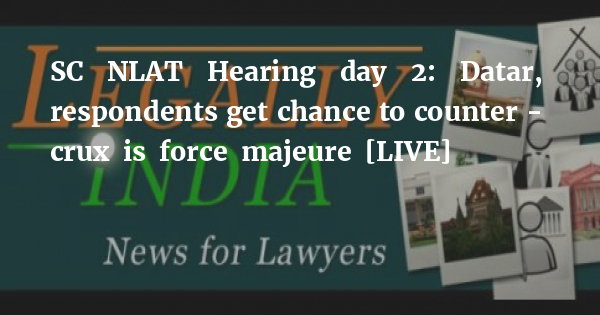
The second day of the National Law Aptitude Test (NLAT) hearings in the Supreme Court is due to start around 11:30am today.
We’ll be liveblogging as we had yesterday, when it was an action- and also humour-packed hearing.
LiveLaw and Bar & Bench are again livetweeting the proceedings, we’ll be blogging them here live.
11:35: Senior advocate Arvind Datar is to start for the respondents (NLS), rebutting the points of the petitioners and the consortium yesterday.
Datar said he would address the following points.
1. He is starting off with the executive council vis-a-vis the academic council.
2. Could NLS have conducted a sparate
3. Safeguards in place for the exam?
The bench added, a fourth point: that a large number of candidates have been deprived, violation of article 14.
5. Regarding Locus – Datar says that Venkata Rao has no standing (though the bench notes: even if the first petitioner doesn’t, the second petitioner (either Venkata Rao or the third petitioner who who joined as intervenor from the Jharkhand high court?), clearly would have locus).
11:38: Datar claims the first petitioner (the parent of a purported Common Law Admission Test (CLAT) and NLAT candidate) has no locus because they could not find a record in the NLAT of them having applied for it.
The former NLS vice-chancellor (VC) Venkata Rao should not have locus either, since he’s neither a member of CLAT or NLS.
11:44: Now discussing whether NLS had power to exit the CLAT consortium.
Datar says that the consortium wrote a letter to NLS yesterday asking for transfer of more than Rs 4 crore CLAT funds from former treasury / secretariat on NLSIU campus to Hyderabad.
Bench responds: CLAT has to be held – leave the CLAT as is – these are all consequential actions because CLAT has to be held.
11:49: Datar now on second point on the issue of AC vs EC at NLS.
There are no regulations at all from 1987 from when NLS was founded specifically about admissions, apparently, says Datar, and the entrance exam was therefore not to do with the academic council (AC), which is responsible for maintaining the standards of education post-admission.
12:02: Going into some history, Datar cites examples of the AC having made recommendations in the past (such as to join the all India admissions test), but only for the executive council (EC) which has the sole authority to execute such recommendations.
12:06: Bench says: Once you are a member, you are bound by the rules of the society? Can you unilaterally go contrary to those rules?
Datar responds that the bylaws of the society are a contract. But in case of force majeure, the crux of the matter, can I make different decisions?
The bench asks again: Did you inform the consortium, the CLAT – if the examination is postponed, we are going to give our separate exam?
Datar: Yes, we have recorded this a number of times, he claims. From July we have been telling them, please don’t postpone it beyond September, I can’t take it.
12:08: Datar: There is a provision in the bylaws for any member to exit. NLS has not exited. But the CLAT consortium has said you are no longer associated. If they tell me, shift all my records to Nalsar, what does it mean?
Bench: But only after you left, did the consortium ask you to transfer the records to Nalsar…
12:15: Datar is listing examples of NLS not having agreed unanimously with the consortium always.
He’s mentioning each of the many CLAT postponements now.
12:18: Datar is mentioning several examples of when NLS registered its disagreement in consortium meetings, apparently.
However, the CLAT consortium kept press releasing that the decisions to postpone were unanimous.
12:20: This notification was not issued with my authority, NLS vice-chancellor (VC) Sudhir Krishnaswamy, sent a message to the consortium saying that he “strongly objects” to the notification having had his name and signature attached.
12:22: Datar says that NLS has said several times, please don’t postpone it beyond September, I can’t take it.